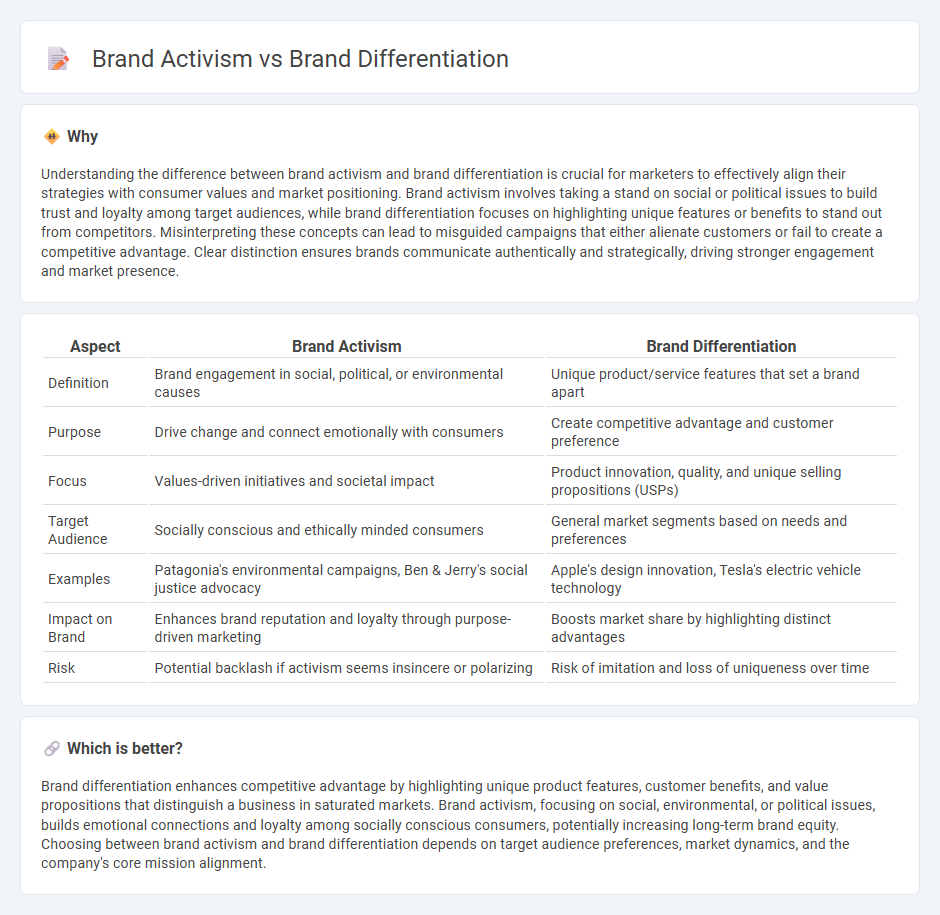
Brand activism involves companies taking a stand on social, environmental, or political issues to align with consumer values and enhance brand loyalty. Brand differentiation focuses on creating unique product features, services, or messaging that distinguish a company from competitors in the marketplace. Explore how balancing brand activism and brand differentiation can strengthen your marketing strategy.
Why it is important
Understanding the difference between brand activism and brand differentiation is crucial for marketers to effectively align their strategies with consumer values and market positioning. Brand activism involves taking a stand on social or political issues to build trust and loyalty among target audiences, while brand differentiation focuses on highlighting unique features or benefits to stand out from competitors. Misinterpreting these concepts can lead to misguided campaigns that either alienate customers or fail to create a competitive advantage. Clear distinction ensures brands communicate authentically and strategically, driving stronger engagement and market presence.
Comparison Table
| Aspect | Brand Activism | Brand Differentiation |
|---|---|---|
| Definition | Brand engagement in social, political, or environmental causes | Unique product/service features that set a brand apart |
| Purpose | Drive change and connect emotionally with consumers | Create competitive advantage and customer preference |
| Focus | Values-driven initiatives and societal impact | Product innovation, quality, and unique selling propositions (USPs) |
| Target Audience | Socially conscious and ethically minded consumers | General market segments based on needs and preferences |
| Examples | Patagonia's environmental campaigns, Ben & Jerry's social justice advocacy | Apple's design innovation, Tesla's electric vehicle technology |
| Impact on Brand | Enhances brand reputation and loyalty through purpose-driven marketing | Boosts market share by highlighting distinct advantages |
| Risk | Potential backlash if activism seems insincere or polarizing | Risk of imitation and loss of uniqueness over time |
Which is better?
Brand differentiation enhances competitive advantage by highlighting unique product features, customer benefits, and value propositions that distinguish a business in saturated markets. Brand activism, focusing on social, environmental, or political issues, builds emotional connections and loyalty among socially conscious consumers, potentially increasing long-term brand equity. Choosing between brand activism and brand differentiation depends on target audience preferences, market dynamics, and the company's core mission alignment.
Connection
Brand activism enhances brand differentiation by aligning companies with social causes that resonate deeply with target audiences, creating unique emotional connections and competitive advantages. Consumers increasingly favor brands that demonstrate authentic commitments to social and environmental issues, amplifying brand loyalty and loyalty-driven revenue growth. Differentiation rooted in activism fosters trust and distinct market positioning, which are critical in crowded and values-driven markets.
Key Terms
Unique Selling Proposition (USP)
Brand differentiation emphasizes highlighting a Unique Selling Proposition (USP) that sets a brand apart from competitors by showcasing exclusive features, benefits, or values. Brand activism involves aligning a company's mission with social or environmental causes to resonate emotionally with consumers and demonstrate corporate responsibility. Explore how leveraging USP and brand activism strategically can amplify your brand's impact and market position.
Social Responsibility
Brand differentiation emphasizes unique selling propositions and distinctive features that set a company apart from competitors, enhancing customer loyalty and market position. Brand activism centers on a company's commitment to social responsibility by actively advocating for social, environmental, or political causes, aligning its values with those of its target audience. Explore how integrating social responsibility into both strategies can strengthen brand identity and consumer trust.
Brand Purpose
Brand differentiation emphasizes creating a unique identity that sets a company apart from competitors, often through distinctive messaging, product features, or customer experience. Brand activism centers on a company's commitment to social, environmental, or political causes, reflecting its core values and resonating with purpose-driven consumers. Explore how aligning brand purpose with both differentiation and activism can strengthen loyalty and impact.
Source and External Links
The Art and Importance of Brand Differentiation - ThoughtLab - Brand differentiation is the unique attributes and positioning that set a brand apart, enabling premium pricing, adaptability to market changes, and requiring a clear understanding of the target audience and the brand's unique value proposition.
What is brand differentiation? + 10 examples - Frontify - Brand differentiation involves identifying and communicating unique brand qualities, such as top-quality products, innovation, sustainability, or customization, to build reputation and appeal to customers distinctly.
5 Strategies to Drive Brand Differentiation - Key strategies include creating emotional connections, innovation, distinctive brand presentation, delivering unique customer experiences, and strategic pricing to effectively set a brand apart in the market.
 dowidth.com
dowidth.com